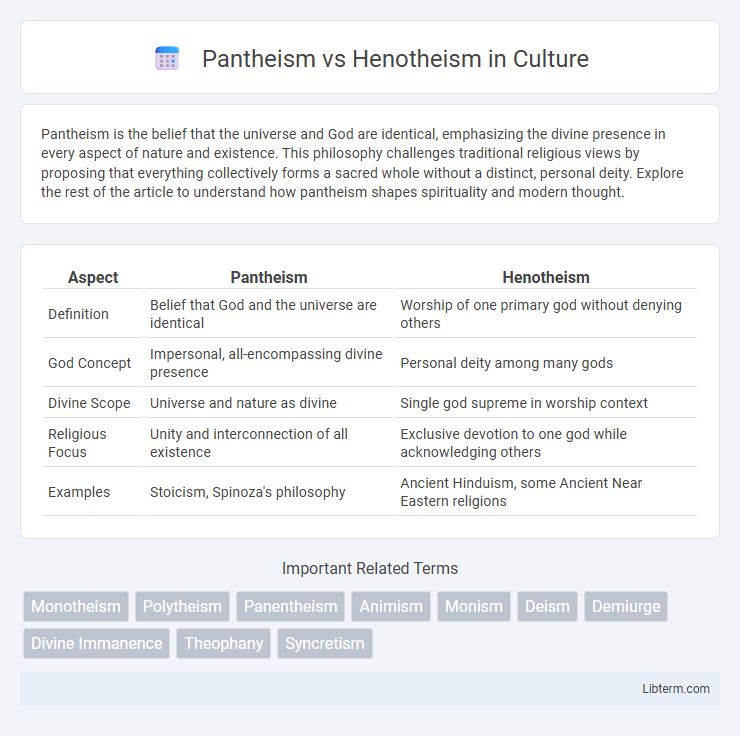Pantheism is the belief that the universe and God are identical, emphasizing the divine presence in every aspect of nature and existence. This philosophy challenges traditional religious views by proposing that everything collectively forms a sacred whole without a distinct, personal deity. Explore the rest of the article to understand how pantheism shapes spirituality and modern thought.
Table of Comparison
| Aspect | Pantheism | Henotheism |
|---|---|---|
| Definition | Belief that God and the universe are identical | Worship of one primary god without denying others |
| God Concept | Impersonal, all-encompassing divine presence | Personal deity among many gods |
| Divine Scope | Universe and nature as divine | Single god supreme in worship context |
| Religious Focus | Unity and interconnection of all existence | Exclusive devotion to one god while acknowledging others |
| Examples | Stoicism, Spinoza's philosophy | Ancient Hinduism, some Ancient Near Eastern religions |
Understanding Pantheism: Core Beliefs
Pantheism asserts that the divine pervades all aspects of the universe, identifying God with nature and existence itself. This core belief emphasizes an immanent deity, where the sacred is not separate but inherently intertwined with the cosmos. Understanding pantheism involves recognizing its rejection of a distinct, personal god in favor of a unified, all-encompassing spiritual essence.
Henotheism Defined: Key Principles
Henotheism centers on the worship of one primary deity while acknowledging the existence of other gods, differentiating it from pantheism, which identifies the divine with the universe itself. Key principles of henotheism include exclusive devotion to a single god without denying the reality or worship of other deities by different groups. This theological framework is prevalent in various ancient religions, where allegiance to one god coexists within a pluralistic pantheon.
Historical Roots of Pantheism
Pantheism traces its historical roots to ancient philosophies such as Stoicism and Vedanta, where divinity is equated with the universe itself, emphasizing an all-encompassing God. This contrasts with henotheism, which acknowledges multiple gods but worships one supreme deity without denying others. Early pantheistic ideas appear explicitly in the works of philosophers like Spinoza, who identified God with nature, solidifying pantheism's foundation in Western thought.
Henotheism in Ancient Cultures
Henotheism, prevalent in many ancient cultures such as Vedic India and early Mesopotamian societies, involves the worship of one primary deity without denying the existence of others, distinguishing it from pantheism, which equates the divine with the entire universe. Ancient Henotheistic traditions emphasized devotion to a single god while acknowledging a pantheon, as seen in the Rigveda where specific deities like Indra or Agni are praised exclusively in different hymns. This approach allowed for localized or personal worship within a broader polytheistic framework, reflecting the complex theological landscape of early civilizations.
Comparing Concepts of Divinity
Pantheism equates divinity with the universe itself, asserting that God and the cosmos are identical and everything collectively forms a divine whole, emphasizing an all-encompassing sacredness. Henotheism centers on the worship of one primary deity while accepting the existence of other gods, maintaining a hierarchy within the divine realm without denying multiplicity. Both concepts address divinity uniquely: pantheism promotes unity and immanence, whereas henotheism allows exclusive devotion within a pluralistic divine framework.
God, Universe, and the Divine: Differing Views
Pantheism identifies God with the Universe, asserting that the divine is immanent in all aspects of nature and reality, blurring distinctions between creator and creation. Henotheism acknowledges the existence of multiple gods but elevates one supreme deity as the primary focus of worship, maintaining a hierarchy within the divine realm. These differing views influence theological interpretations of the divine's presence, authority, and relationship with the cosmos, shaping spiritual practices and beliefs about the interconnectedness of God and the Universe.
Rituals and Spiritual Practices
Pantheistic rituals often emphasize unity with the cosmos through meditation, nature worship, and mindfulness to experience the divine in all things. Henotheistic spiritual practices prioritize devotion to a chosen deity while recognizing other gods, often involving specific ceremonies, prayers, and offerings tailored to that god's attributes. Both systems integrate symbolic acts and communal gatherings, but pantheism leans towards universal spiritual connection, whereas henotheism centers on particular divine relationships.
Philosophical Implications of Each Belief
Pantheism posits that the divine is identical with the universe, suggesting an interconnected, immanent reality that dissolves distinctions between creator and creation, thus challenging traditional metaphysical dualism. Henotheism, by recognizing a supreme deity among many gods, maintains theological hierarchy and plurality, which supports a viewed coherence in divine authority without denying other deities' existence. Philosophically, pantheism encourages holistic monism impacting ethics and ontology, while henotheism offers a complex theistic framework accommodating both unity and diversity in divine beings.
Modern Interpretations and Movements
Modern pantheism emphasizes the universe itself as divine, promoting a holistic spirituality that aligns with ecological awareness and scientific understandings of existence. Henotheism in contemporary contexts often appears within certain New Age and spiritual movements, recognizing multiple deities while focusing worship on one specific god or goddess without denying others. Both frameworks influence modern religious pluralism and personal spiritual exploration, reflecting diverse interpretations of divinity beyond traditional monotheistic paradigms.
Pantheism vs Henotheism: Similarities and Differences
Pantheism and henotheism both involve reverence for deities, but pantheism equates God with the universe, emphasizing an all-encompassing divine presence, while henotheism centers on devotion to one supreme god without denying the existence of others. Pantheism promotes a holistic spirituality highlighting interconnectedness and unity of all existence, whereas henotheism reflects religious pluralism by prioritizing one deity among many. Both address the divine's nature but differ in scope, with pantheism embracing universal immanence and henotheism maintaining the primacy of a particular god within a polytheistic context.
Pantheism Infographic

 libterm.com
libterm.com